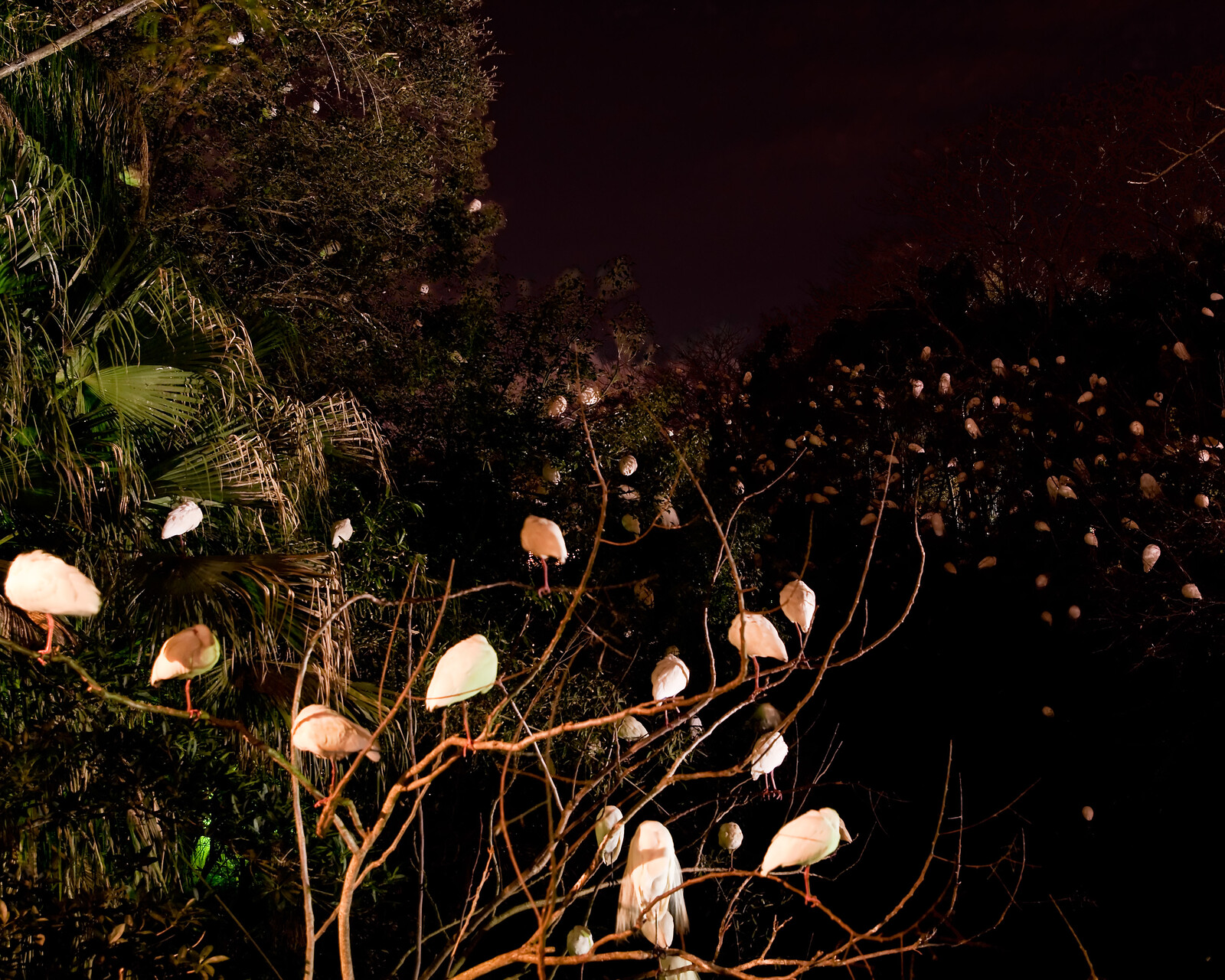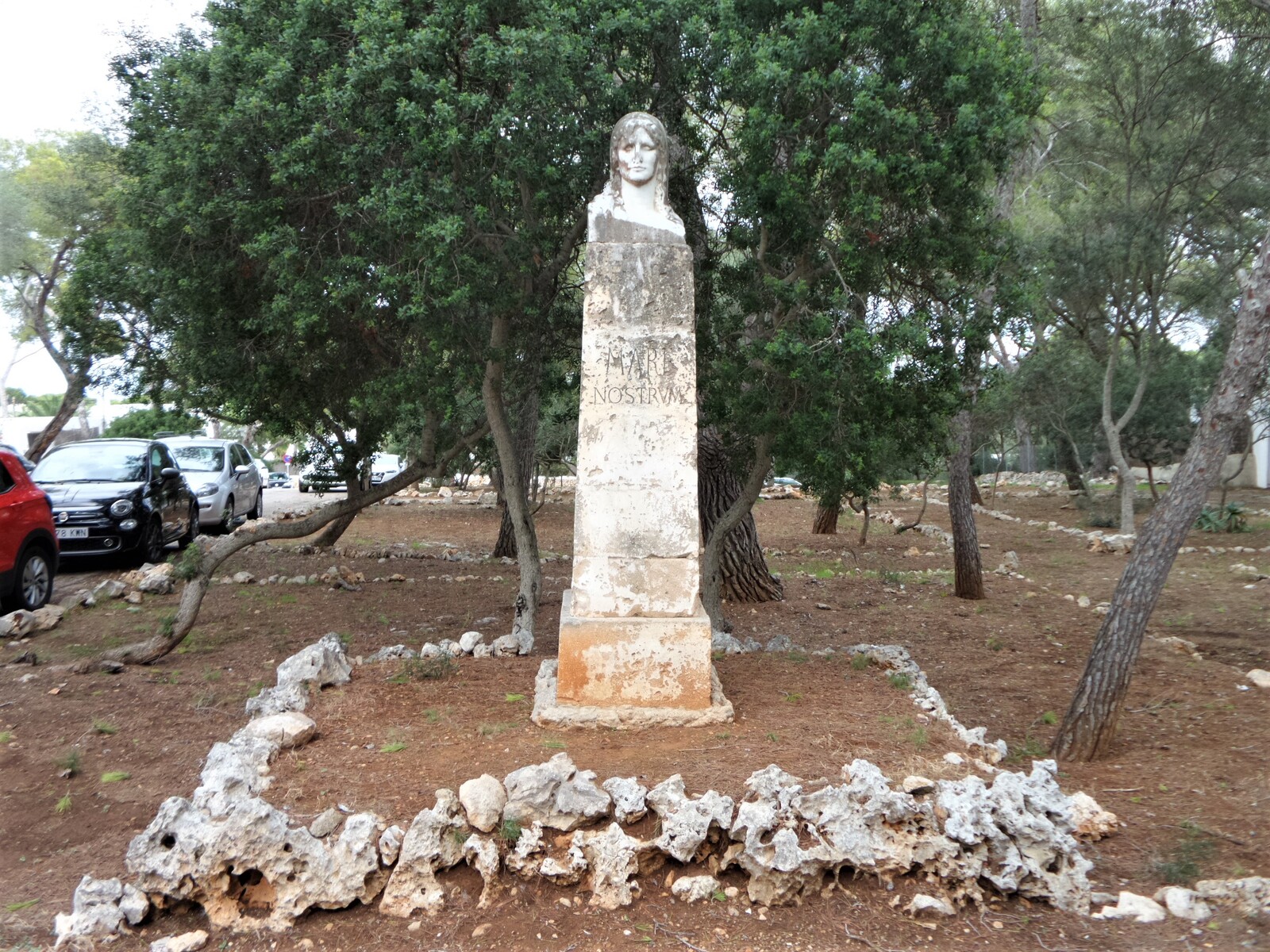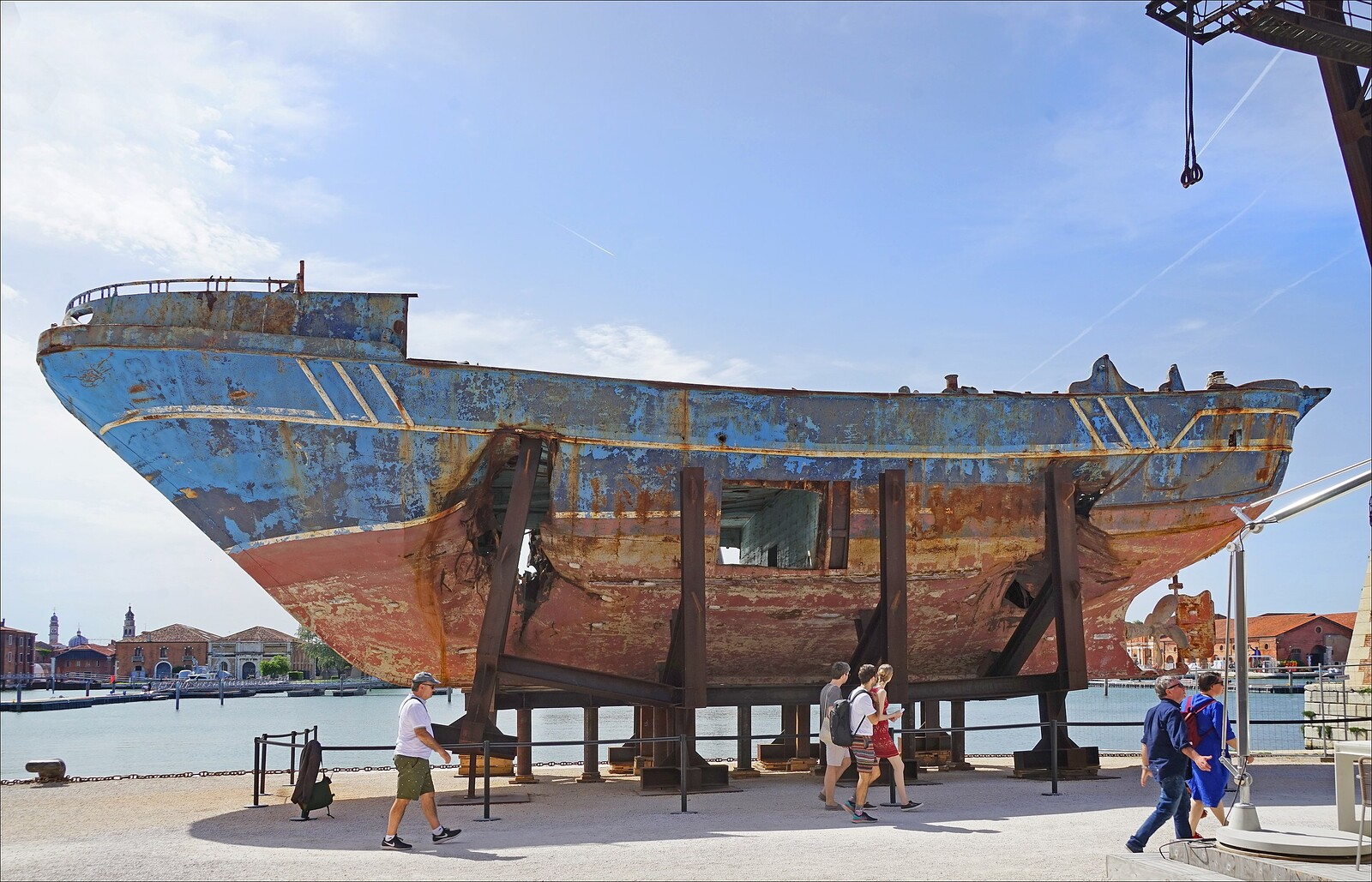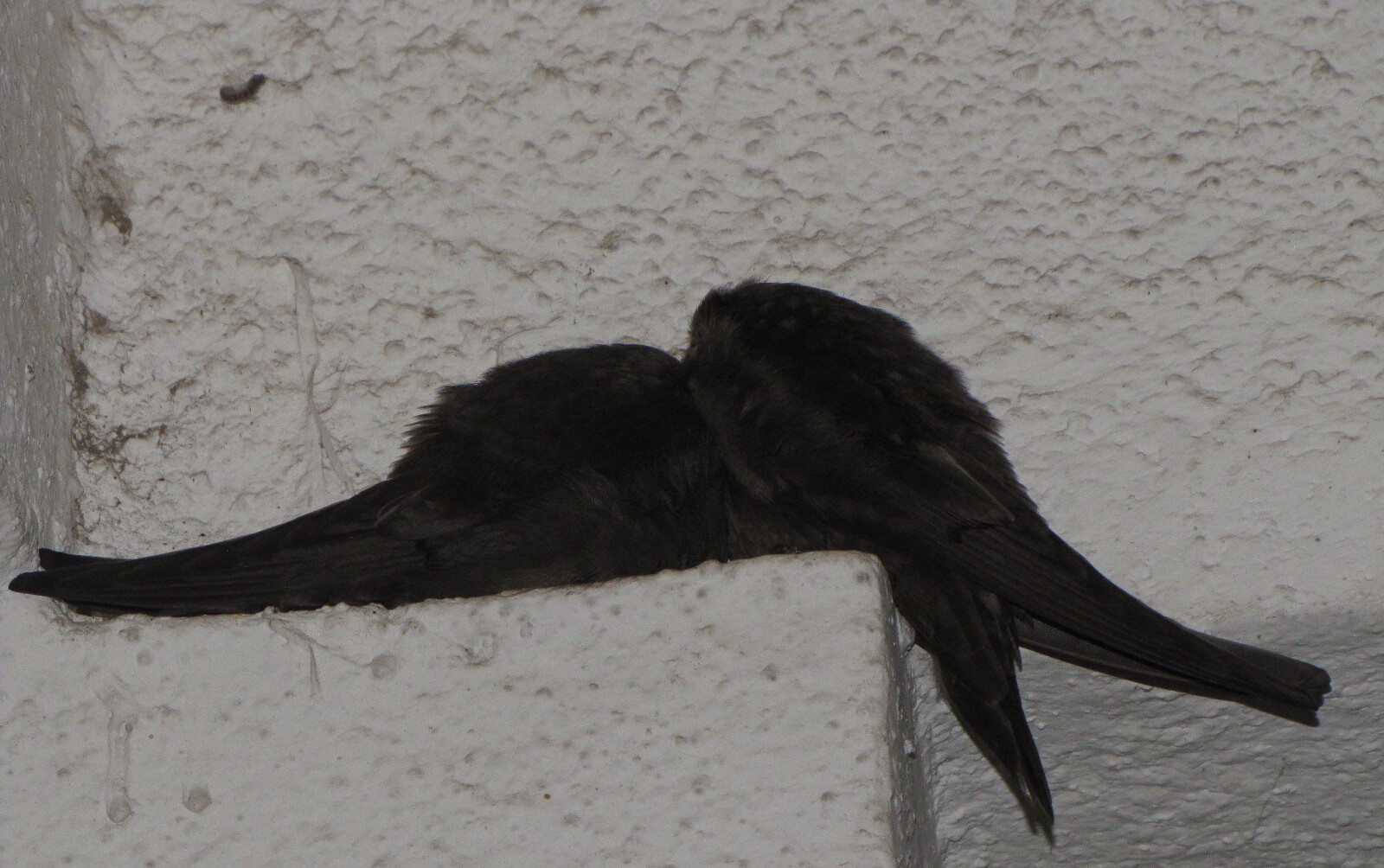

Birds sleep in the trees at Disney’s Animal Kingdom, Bay Lake, Florida. Photo: CC BY-SA 4.0.
Poets and beggars, musicians and prophets, warriors and scoundrels, all creatures of that unbridled reality, we have had to ask but little of imagination, for our crucial problem has been a lack of conventional means to render our lives believable. This, my friends, is the crux of our solitude.
—Gabriel García Márquez, “The Solitude of Latin America” 1
Since Russia’s violent invasion of Ukraine began a few weeks ago, I have found myself—like many others, I assume—restless by day and even more so by night. When the birds settle in for their slumber, and the crickets stridulate and other insects proclaim and celebrate the night with their chirps and other creaking noises, I have found myself unsettled, turning over, churning, and kneading my pillow all night long. At the break of dawn, my pillow looks like it metamorphosed through the various stages of Albrecht Dürer’s Six Studies of Pillows (verso) from 1493. And as I look at the facets and contours, the twists and turns, the rough waves and tides, and Dürer’s clean hatchings, I wonder how Volodymyr Oleksandrovych Zelenskyy’s pillow must look after all these nights of bombings. I wonder about the unease of sleep and sleepless nights that the people of Ukraine have been going through, tumbling across and biting teeth in their pillows with each strike. And I think of the many innocent Ukrainian people—daughters, sons, sisters and brothers, friends, and relatives—that have been going nights without pillows in metro stations and bunkers. All this while, some NATO and western leaders seem to have placed their jagga-jagga pillows on their heads, covering their eyes and ears and hidden in the comfort of the warm apartments and offices. These same leaders brought Ukraine into this mess in the first place by flirting and courting Ukraine into its orbit, promising to stand by Ukraine when shit hit the fan, then hid their tails between their legs like a ngong dog, and began by naming unimpressive and impotent sanctions on Russia and thereby putting Ukraine into an even more vulnerable and delicate position vis-a-vis a ruthless and rancorous Putin, who won’t shy away from using Russia’s atomic might to reach his goal. So, my solidarity, sympathy, and support goes to the Ukrainian people as they go through these unbearable times.
In the past weeks, friends within and outside of my art circles, artists, colleagues, students, and many others who I am not really acquainted with have reached out to me asking for me to make a public statement and sign or share letters in solidarity with Ukraine. While I have shared my solidarity with them, I have made it a point, just as I have done in past years when contacted regarding other conflicts, that solidarity is not a one-way street, solidarity must be multidimensional and multidirectional, solidarity is not colored white and must also apply to the “darker than blue” of the world, and solidarity cannot be a racialized notion or practice.
Calls for solidarity, especially in support of Ukrainians trying to leave the country to get into Poland and other neighboring countries, are very timely as children, women, and men are in dire straits. But what is most baffling is that in the height of Winter 2021/22, just a few weeks ago, thousands of people fleeing from war in the Middle East were also trying to cross these same borders into Poland and were beaten up, maltreated, shot at by the border police, while many were left to die in the cold. None of the many colleagues and friends writing to me today, and very few in my inner circles, showed concern for the fate of the Middle East refugees, and none started a solidarity movement for the Syrian, Yemeni, or other causes while people fleeing those places were stuck at the border. Do the Middle Eastern women and children not deserve as much refuge and solidarity as any other humans in need?


Albrecht Dürer, Self Portrait, Study of a Hand and a Pillow (recto); Six Studies of Pillows (verso), 1493.
As I write, news and videos are circulating on social media showing hundreds of the more than thirty thousand Africans in Ukraine who are trying to leave the country, too. The only difference being that while the world is uniting in solidarity with Ukraine, the Ukrainian army and paramilitias are stopping Africans, South Americans, and Caribbeans from boarding trains. It is said that priority is given to Ukrainians. A note must be made here that by Ukrainians they mean white Ukrainians, as many of these black and brown people also carry Ukrainian citizenship. According to witness reports, the Ukrainian military has pointed out that they prioritize escaping children and women, but at the same time they have stopped black women and black children from boarding refugee trains. As it were, some black and brown people who succeeded in getting on the trains and buses after enormous insistence and pressure are being hindered by border control in neighboring countries like Poland. Solidarity doesn’t seem to be blind; it seems to discriminate along color lines. Solidarity itself seems to have a color, and it is not brown or black. Unlike the discriminate solidarity we are observing unfold in this drama, the bombs dropped by the Russian army in Ukraine are indiscriminate, know no skin colors, know no racial denomination—the bombs just kill.
The past years have been, to say the least, disconcerting. As the world struggled to come to terms with a fierce virus ravaging through all its continents, the state of Ethiopia and its allies waged war against the Tigray People’s Liberation Front (TPLF) and the people of Tigray at large. According to Jason Burke and Dan Sabbagh in a November 5, 2021 article in the Guardian, journalists and aid workers have been banned from combat zones, there is an internet embargo, and humanitarian agencies still in contact with people in Tigray have reported insurmountable casualties on the ground; an estimated 100,000 people have been killed in just a year of fighting. RFI and BBC as well as local radio stations have reported massacres and countless sexual assaults on women and children as punishment, and there seems to be an orchestrated famine that will affect hundreds of thousands of people in Tigray thanks to blockades by the Ethiopian government. There seems to be a genocide at play in Ethiopia as the world looks on. As the Guardian points out, “On 3 November, a joint UN-Ethiopian report on the conflict—the most comprehensive yet detailed firsthand accounts of a string of human rights violations, some of which ‘may amount to war crimes and crimes against humanity,’ according to Michele Bachelet, the UN high commissioner for human rights.”2 To this day, I am still waiting for just one of my liberal art friends and colleagues, mostly discourse-leftists, concerned with the world and ready to go to any protest against environmental crisis, to write to me asking for my solidarity with and support for the people of Tigray. And as I wait, I am forced to ponder if more than a year and over a hundred thousand dead, the people of Tigray are not receiving the same solidarity as our European brothers and sisters because they are too far away, not white enough, too black, or just not human enough to receive the same solidarity?


Parc Mare Nostrum, Cala d‘Or, La Palma, Spain. Photo: CC BY-SA 4.0
Cameroon, my country of birth, has been in a ferocious war. At least the “anglophone” part of the country from which my family comes has, to a large degree, become a no-go area. It is thanks to this war that saw young and old kidnapped, children and women cold-bloodedly murdered by both the government troops and the Ambaboys, that my parents, in their 70s, had to go in exile, where my father eventually passed. As Bang and Balgah point out in their paper “The ramification of Cameroon’s Anglophone crisis,” this conflict has led to the displacement of over 1.3 million Anglophone Cameroonians—internally displaced persons and refugees to neighboring Nigeria. In some villages, over 80 percent of the inhabitants have escaped into and now live in the bushes; in the space of five years, some villages have become completely deserted and reduced to ghost towns. The casualties in this crisis amount to anywhere between four and fifteen thousand civilians. These are things I have written about widely in essays and talked about in lectures, as well as numerous posts on social media. The war has brought particularly crass human rights violations, like when the Government’s security forces, besides its excessive use of force and torture of suspected separatists and detainees, also burnt down houses of anglophones in more than 170 villages, including the massacre of twenty-one unarmed civilians in Ngarbuh village of the North West Region of Cameroon on February 14, 2020.3 In that same year, on October 24, 2020, young men, presumably Ambaboys, stormed a school in Kumba, South West Region, with guns and machetes, and filmed themselves killing seven children aged twelve to fourteen years and injuring more than thirteen more.4 After these atrocities, I hardly saw any indignation from the same people calling for me to show solidarity, nor did I see anyone hoisting the flags of Cameroon nor Ambazonia on their Facebook walls. Here too, to this day, I am still waiting for just one of my liberal art friends and colleagues, mostly discourse-leftists, concerned with the world and ready to go to any protest against environmental crisis, to write to me asking for my solidarity with and support for the people of Anglophone Cameroon. And as I wait, I am forced to ponder if after more than five years of war, the people of Anglophone Cameroon are not receiving the same solidarity as our European brothers and sisters because they are too far away, not white enough, too black, or just not human enough to receive the same solidarity?
This, too, is the case with conflicts in Myanmar where the military government took power in a crushing coup, or in Mexico where civilians and journalists are massacred on a daily basis as they get caught up in narcotrafficking crimes. Here, too, hardly any indignation and hardly any solidarity, seemingly because the lives of these people are not worth the tears and solidarity of the rest of the world.
As for the Democratic Republic of Congo, we seem to have all stopped counting the number of people killed in the manifold conflicts that have engulfed the country in the past decades. In the larger scheme of things, the life of a young person in Congo might just as well be as worthy as the life of a summer fly smacked on a wall. But as the Global Conflict Tracker informs us, the United Nations estimates there are about 4.5 million internally displaced persons in the DRC, and more than 800,000 DRC refugees in other nations.5 Though the second Congo war officially ended in 2003, and is said to have cost 5.4 million lives, it is said that from its official end until now a few more million have gone down. Despite these alarming figures, not even the US-initiated Black Lives Matter movement reports a headache when thousands of people are killed in Congo. Not only do some lives matter more than others, also some black lives are more worthy than others.
In 2015, after the cowardly terrorist attacks on satirical magazine Charlie Hebdo that left twelve people dead, the French president at the time, Francois Hollande, called for global solidarity. These twelve French lives and five others killed were powerful enough to pull sixty world leaders to Paris—leaders who marched with large crowds to show their indignation against terrorism. Amongst these sixty leaders were former Prime Minister Binyamin Netanyahu of Israel, Germany’s former Chancellor Angela Merkel, former EC President Donald Tusk, Palestinian President Mahmoud Abbas, Mali’s former President Ibrahim Boubacar Keita, and several other African leaders. The value of black African lives can clearly be measured in times of crisis, especially terrorist attacks, as for several years now, we have seen terrorist attacks in Mali, Cameroon, Nigeria, and many other places, but never have we seen such a roster of leaders come to these countries to show solidarity—not even the African leaders, not even when their kind are killed, because in the colonial mindset, the lives of people in Paris are more valuable than the lives of their own people. Some lives seem to be more equal than others.


Barca Nostra at the Venice Biennale, 2019. Photo: CC BY-SA 4.0.
To whom do we owe solidarity? Who deserves our solidarity? Which lives are worth solidarizing for and with? Which books should we read, which flags should we hoist, what statements of solidarity should we share online on social media when thousands of people from the African continent and the Middle East drown in that most vile grave of modern times, the Mediterranean Sea? What colors of indignation should we wear, what songs of lamentation should we sing and in what language, what will be the taste of our tears—salty or sweet—when thousands of people drown in that Mare Nostrum, the Mediterranean Sea? Sometimes I wake up from a nightmare, sweaty and cursing that a hundred cats had drowned in the Mediterranean Sea and people had filled the streets of Europe and the EU had declared three days of mourning.
When Russia launched this war on Ukraine, I was in Martinique on a research trip combing through the repercussions of the 600-year-long, European-initiated transatlantic slave trade that saw the abduction and displacement of millions of Africans to the Americas. Many millions never reached the other shores of the Atlantic as they died of the brutal conditions of transportation or were willfully dumped off the ship, as was the case with the Zong massacre of 1781. This enterprise was enabled by, and also produced as consequence, the dehumanization of people. Its dismal realities still live on. This genocide of most alarming proportions is something we have learned to take for granted as we walk through plantations, through distilleries, visit colonial churches transformed into cultural centers in whose gardens the most beautiful roses and other tropical plants grow. It is frightening to see just how beautifully, exquisitely, and sumptuously roses can blossom when they are watered with the blood of the enslaved and are growing on their decaying cadavers.
The white dismissal of black human beings’ humanity causes continued destruction in myriad ways. In 1981, 133 years after the abolition of slavery in Martinique, the French state still authorized the chemical Chlordecone to be exported and used in banana plantations in the French West Indies—France’s black-populated overseas departments. This was despite the prohibition of Chlordecone’s/Kepone’s production and marketing in the US in 1975 because workers suffered from “uncontrollable shaking, blurred vision and sexual problems,”6 and despite the fact that it was classified by the WHO as potentially carcinogenic already in 1979. Though used till 1993, the repercussions of Chlordecone usage still resound till today on the island. As Professor Luc Multigner of Rennes University points out, toxicological and experimental data show that Chlordecone is carcinogenic and responsible for five to ten percent of prostate cancer cases in the French West Indies, while epidemiological studies have shown an increased risk of premature births and adverse brain development in children due to the consumption of contaminated food 7 I am giving these examples not to fetishize the violence, but to emphasize that there are threads that tie the enslavement enterprise, colonization, contamination, and a lack of solidarity together, which are all built on the repudiation of some people’s humanity.
It is obvious that more than 600 years of dehumanization and othering have thrusted some humans into the solitude of existence. This is not a self-chosen but an imposed solitude—not within themselves, per se, but from those who have historically been the disenfranchisers, and who to date still have the leverage and call the shots on who deserves or does not merit solidarity. It is worth looking at the way that two of Europe’s historical pariahs, Sinti and Roma communities, are discriminated upon on a daily basis, especially now during the war in Ukraine. The Roma communities have been subject to unspeakable cruelties while trying to cross borders and seek refuge from the war in Ukraine. As Andrei Popoviciu writes of one Roma woman: “Cristina travelled from Kharkiv to Lviv, then to the Moldovan border. But there, she said, she spent four days in the cold waiting to enter Moldova, without any food or water. Once they found shelter, she and other Roma were chased out of their tents by the Ukrainian border authorities. Cristina is one of an estimated 400,000 Ukraine’s Roma people who, besides the trauma of war, have to cope with discrimination along their evacuation route out of Ukraine.”8 How can we talk about solidarity in a context in which some are treated more or less Ukrainian than others based on their “ethnicity” or “racial bearing”?
In Martinique, my colleague Raisa Galofre read out loud to us the acceptance speech of the great Colombian Nobel laureate Gabriel García Márquez. Evoking William Faulkner, who said, “I decline to accept the end of man,” Marquez went on to add: “Faced with this awesome reality that must have seemed a mere utopia through all of human time, we, the inventors of tales, who will believe anything, feel entitled to believe that it is not yet too late to engage in the creation of the opposite utopia. A new and sweeping utopia of life, where no one will be able to decide for others how they die, where love will prove true and happiness be possible, and where the races condemned to one hundred years of solitude will have, at last and forever, a second opportunity on earth.”9 This statement, which left me shaking, also brought me to the simple and maybe banal realization that the wars in Ukraine, in Tigray, in NoSo Cameroon, in Yemen, and West Sahara have in common the inheritance of a necrophantasm and bear with them the heritages of cultures in which the weapons industries thrive more than healthcare or food industries, in which death is the fuel that drives the machinery of neoliberal socioeconomic systems that privilege death itself over life.


Swallows sleeping in a parking lot, 2014. Photo: CC BY-SA 4.0.
But to solidarize is to privilege life over death; it is to negate the possibility of some to decide for others how they should die. To solidarize is to create structures, networks, fertile grounds on and within which love will prove true and happiness must be possible, and to solidarize is to ensure that the races that were condemned to one hundred years of solitude will immediately and long-lastingly have their due opportunity on earth. Or to put it in Marquez’s words again:
In spite of this, to oppression, plundering and abandonment, we respond with life. Neither floods nor plagues, famines nor cataclysms, nor even the eternal wars of century upon century, have been able to subdue the persistent advantage of life over death. An advantage that grows and quickens: every year, there are seventy-four million more births than deaths … a sufficient number of new lives to multiply, each year, the population of New York sevenfold. Most of these births occur in the countries of least resources–including, of course, those of Latin America. Conversely, the most prosperous countries have succeeded in accumulating powers of destruction such as to annihilate, a hundred times over, not only all the human beings that have existed to this day, but also the totality of all living beings that have ever drawn breath on this planet of misfortune.10
But for this to happen, we must ask ourselves some crucial questions: How can we build structures of solidarity that go beyond the power gradients imposed by coloniality? How do we conceive solidarity basis that transcend our skinfolks and kinfolks?
What is a solidarity unplagued by whiteness? Can we afford a cherry-picking solidarity in which some humans are more equal than others?
Solidarity is only solid and worthy of the name solidarity if it goes out and beyond its comfortable premises and embraces those who have been banished in solitude of existence. Solidarity is only worth anything if we accept, cultivate, and propagate what Amitav Ghosh calls in “The Nutmeg’s Curse” the politics of vitality—and not only for ourselves, but for all kinds and species on the blessed planet through which we are just passing.
It must be said loud and clear that I stand against the Russian invasion of Ukraine and against the Western machinations and manipulations that led to this. But it must also be said louder and clearer that no lives are more equal than others and no one deserves less solidarity than the other. After all, in the short time in which we all accommodate this space called earth, and in which we walk on and feed on the gifts of its soil, all we want is to be able to—with our families, friends, and even foes—find a pillow to lay our heads on and find rest. And if we cannot ensure that those trying to cross the Sahara or the Rio Grande or the Mediterranean Sea or otherwise, too, can find a pillow to rest on, then we will never find peace … for solidarity is the utmost means to render our lives not only believable, but also livable.
An abridged version of this essay was first published in New Frame, a nonprofit social justice media publication based in Johannesburg, South Africa.
Gabriel García Márquez, Nobel Lecture, 1982 →
H.N. Bang, R.A. Balgah, “The ramification of Cameroon’s Anglophone crisis: conceptual analysis of a looming ‘Complex Disaster Emergency,’” Journal of International Humanitarian Action 7, no. 6 (2022). →
Ibid
Gabriel García Márquez, Nobel Lecture, 1982 →
Ibid